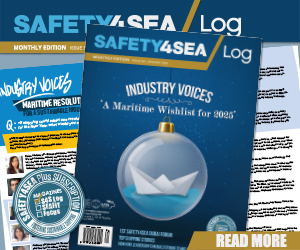In an exclusive interview to SAFETY4SEA, Mrs Patrizia Kern, Chair of IUMI’s Data & Digitalisation Forum and Chair, Poseidon Principles for Marine Insurance, Head Marine, Director at Swiss Re Corporate Solutions highlights the need for all industry stakeholders to play their part in contribution to the net zero transition.
Furthermore, Mrs Kern refers to actions for embracing ESG in the maritime industry, highlighting that technology and data play key roles towards. Data are important when it comes to climate change, Mrs Kern comments who thinks that currently, the discussion around climate change is more emotional than factual and data-based.
S4S: What are the top priorities in your agenda for the next five years?
Patricia Kern: My main priority is to continue to bring forward the ESG agenda in the shipping industry. With the Poseidon Principles and the Poseidon Principles for Marine Insurance we have created a framework for transparency. By establishing baselines for emissions data collections and reporting, the Principles allow lenders and insurers to gain access to individual ship information and work together with shipowners to meet the goals set by the International Maritime Organisation. I believe that the urgency of the climate crisis requires all stakeholders in the marine industry to play their part in contribution to the net zero transition. This is a massive endeavour and we appreciate the efforts of the marine industry.
S4S: How do the Poseidon Principles for Marine Insurance (PPMI) and IUMI cooperate?
P.K.: The Poseidon Principles for Marine Insurance provide a global framework for assessing and disclosing the climate alignment of insurers’ hull and machinery portfolios. They establish a common, global baseline to quantitatively assess and disclose the climate alignment of insurance portfolios in order to assess the environmental and climate impact of business decisions – thus enabling the insurance sector to improve transparency. The Poseidon Principles for Marine Insurance are consistent with the policies and ambitions of the International Maritime Organization (IMO) and have also chosen to take steps toward alignment with the Paris Agreement. The International Union of Marine Insurers (IUMI) is a Supporting Partner of the PPMI. We are very grateful for IUMI’s support, which has contributed enormously to our being able to develop this initiative.
S4S: What are the PPMI ambitions and how are these aligned with other ESG initiatives in the maritime sector?
P.K.: The case for cutting CO2 emissions from shipping is clear. The industry currently accounts for nearly 3% of the global total, according to the International Maritime Organization. The IMO says that by 2050, greenhouse-gas emissions from the industry should be reduced by at least half from 2008 levels. But if business continues as usual, emissions could soar by as much as 130% over the next three decades. In April 2022, the Poseidon Principles for Marine Insurance formerly entered into force. Announced in December 2021, the initiative is aimed at providing transparency on carbon emissions and supporting the shipping industry’s green transition. The framework follows similar and related initiatives: the Poseidon Principles for Financial Institutions, and the Sea Cargo Charter, which assess and disclose the climate alignment of the world’s largest energy, agriculture, mining, and commodity trading companies’ shipping activities. The initiative was in an advantageous position as it was able to build on the International Maritime Organization Data Collection System (IMO DCS). The directive, which entered into force in 2018, requires shipowners and operators to gather and submit fuel consumption data, which is used to track vessel GHG emissions. Ultimately, the urgency for transparent data stems from a need to make ESG measurable. Not doing so will attract more scrutiny from regulators and NGOs and heap more pressure on the industry to back up the claims it is making publicly.
S4S: In your view, has our industry realised the importance of ESG? What should be the next steps towards an ESG-ready industry?
P.K.: We have made a lot of progress in the last four years to drive the ESG agenda forward in the shipping industry. It is an opportunity to strategically position ourselves and show that we are the oldest line of business but in this case, we have an extremely forward-looking view, and we are ready to be measured, to disclose – I think it’s something we should be really proud of. We are working on raising the level of understanding of ESG within the marine insurance industry. We need to tackle these industry issues together and cooperate as we have common interests.
S4S: How can the maritime industry actually address ESG requirements? What are the lessons learned from other sectors?
P.K.: The fact that we need to move from excluding certain types of risk to measuring the risk has been a discussion for years. This is for us an opportunity to do it. I am confident that KPIs established will help to convince the industry of the value of signing up to the PPMI. We are here committing to assess, report and measure ourselves, and to continue to benchmark. This is a unique opportunity for the industry to become very tangible, and to create incentives for those that are doing the right things. It’s an effort that we must approach together. The good thing is that we have various sectors represented in the maritime ecosystem. We can all learn and profit from each other, from charterers to energy producers to insurers.
S4S: How will technology and data play key roles in helping the maritime industry comply with ESG?
P.K.: Technology and data play key roles, as we need to make our decisions based on data. As an industry we need to embrace data better if we are to successfully implement ESG aspirations. Data on assureds’ activity is available, it needs to be consistent, reliable, relevant and provable to be of use. ESG is here to stay: Over 92% of the S&P Global 500 companies now report on their ESG metrics and marine insurers are catching up fast. But ESG is meaningless unless it is substantiated by verifiable data. We have an opportunity to transform the marine industry and make it more attractive for investors and a new generation of socially conscious marine underwriters. We need to be ready to share more information with each other and standardise this data if we are to fully realise the benefits of taking an ESG stance.
S4S: How may industry stakeholders embrace more innovative solutions that will facilitate maritime’s digital transformation?
P.K.: Digitalisation is not an option anymore, but a must and the marine insurance sector needs to keep pace. For some time now, the shipping industry has been seeking cost-effective ways to operate and key logistics players have already begun to partner and digitalise the global marine supply chain. The current pandemic has accelerated this process and marine insurers and underwriters need to upgrade their skills and embrace digitalisation to minimise the risk of becoming redundant in the future. We see that the market leaders have embraced the innovative potential of the industry, we now need to make sure that the smaller players are not left behind.
S4S: If you could change one thing in the industry to boost ESG awareness from your perspective, what would it be and why?
P.K.: The discussion around climate change tends to be very emotional. I would prefer it to be more factual and data based. Climate change has far-reaching consequences, impacting weather patterns, natural ecosystems, human health and the global economy. Swiss Re Institute estimates that the impacts of rising temperatures could reduce global GDP by as much as 18% by 2050, compared with a world without climate change. It will affect all of us and it’s in our hands to minimise the effects by acting now with a cool head and ambitious mind.
S4S: Do you have any new projects or plans with regards ESG that you would like to share with industry stakeholders?
P.K.: I aim to continue to enlarge the Poseidon framework and add new members. We are currently 30 shipping banks and 17 marine insurance providers and brokers committed to adopting an emissions reduction trajectory in line with net-zero commitments, as soon as such a trajectory or trajectories become available. Once a new trajectory based on credible and well-recognised sources is established and adopted by the members of the individual initiatives, signatories will benchmark their portfolios against two trajectories: one aligned with the IMO’s 50% reduction by 2050, and one aligned with net-zero by 2050 and a maximum temperature rise of 1.5 C above pre-industrial levels by 2100, to meet the temperature goals of the Paris Agreement. For the second trajectory to be consistent with a 1.5 C future, the scope will be expanded to include all greenhouse gas species, and to account for well-to-wake emissions.
S4S: What is your key message to industry stakeholders towards sustainable shipping?
P.K.: The transition to net zero is a massive endeavour and we appreciate the efforts of the marine industry. Decarbonisation of shipping cannot be solved by one actor on its own. It requires close collaboration between the various stakeholders in the shipping ecosystems and related sectors. Establishing common global decarbonisation trajectories will help us make business decisions that reflect the latest available climate science. We have already made progress as an industry, but we need to follow the path to net zero in a very disciplined and consequent way.
The views presented hereabove are only those of the author and do not necessarily reflect those of SAFETY4SEA and are for information sharing and discussion purposes only.































































